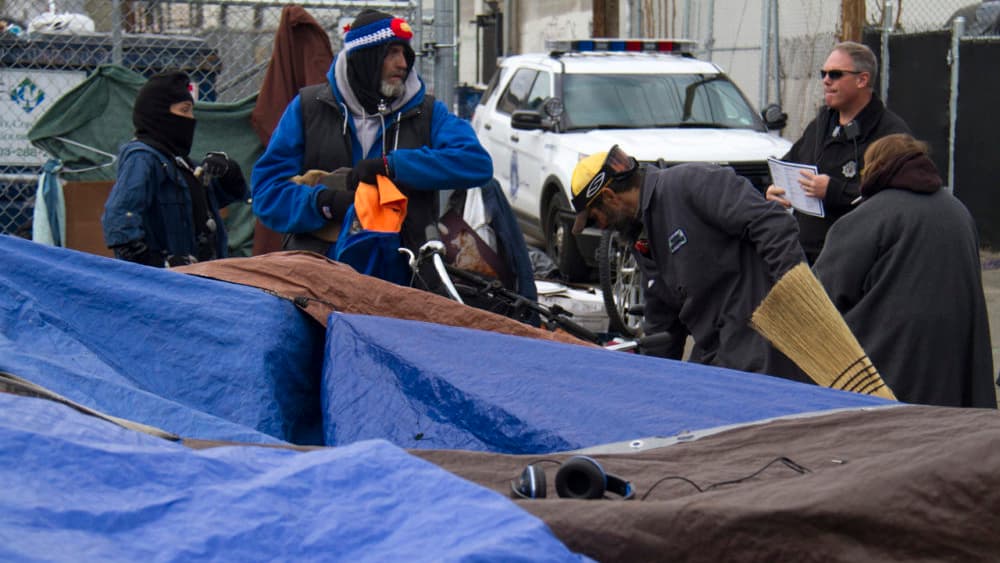A small gathering behind the Alfred A. Arraj United States Courthouse on Friday was a chance for Charles Wadsager to get details of a settlement he hopes will mean more protection for himself and others experiencing homelessness.
Members of the advocacy group Denver Homeless Out Loud passed out summaries of the settlement, first reported on Wednesday. Once a federal judge and City Council sign off, the agreement will end a class action suit that had challenged the city's practice of clearing people and their belongings from Denver streets. Under the settlement, the city will give a week's notice before clearing large-scale encampments; attach written notices to unattended personal property in areas it clears regularly and wait 48 hours before removing the items; enact policies to ensure the return of property taken away during clearances; and take steps to improve the lives of people experiencing homelessness.
City Attorney Kristin Bronson has said the settlement's terms "are not only favorable for people experiencing homelessness, but also reflective of their investment in working with the city and their representatives to find solutions to the benefit of all."
Wadsager said in the 15 years he's been on the streets, he's had belongings confiscated and been told to move along more times than he can count. He's heard promises from the city before, he said.
"What will make this different is them being told by a judge," he said.
Plaintiffs attorney Jason Flores-Williams said leafletting and information tables set up at homeless shelters will be used to spread the word once the settlement is finalized. Flores-Williams's co-counsel Andy McNulty gave out his phone number to the activists and people experiencing homelessness gathered at the court house and said he was ready to consult with anyone who needed legal advice.
"We have to keep fighting to make sure these rights are enforced," said Terese Howard of Denver Homeless Out Loud, which had been tracking and publicizing the impact of the "sweeps" of homeless encampments when Flores-Williams approached with the idea of going to court.
The long-running case began with a group of men suing over how city employees handled their belongings during a series of street clean-ups in 2016. The next year, U.S. District Court Judge William Martinez granted the suit class-action status, which would have meant any ruling affecting city policies could have had broad implications. A federal trial had been set to start later this month.
Howard said the agreement with the city "is something that we should have had from the beginning. It's basic constitutional rights."
Denver Homeless Out Loud has also characterized a Right to Survive initiative it got on Denver's May municipal ballot as a matter of basic rights. Howard ended Friday's gathering with a call for people to vote for the initiative, which has been criticized by some as broad and vague.
The initiative would overturn the city's camping ban by establishing a "right to rest" protected from the elements in public. It also calls for people to be able to eat and share food in public places where food is not prohibited, to shelter in legally parked motor vehicles and "to have a right and expectation of privacy and safety of or in one's person and property." It would be illegal "for an employee or agent of any government agency, corporation, business, or other entity to harass, terrorize, threaten, or intimidate" anyone exercising the rights spelled out in the proposed ordinance.
The settlement in the "sweeps" suit includes an agreement by the city to pay $5,000 to each for the six lead plaintiffs and unspecified attorneys' fees. The lengthy agreement stipulated at several points that it did not constrain the city's ability to act quickly in cases when public health and safety were threatened.
Other elements include requiring the city to provide public lockers and trash bins, portable toilets and places for needles to be discarded in parts of town frequented by people experiencing homelessness. Documents described as "homeless ID" cards will be created to make it easier for people experiencing homelessness to take advantage of its Parks and Recreation Looking to Assist You, or PLAY, program that offers special rates for low income adults and families who want to use rec centers. The city also agreed to provide sensitivity training for staff who frequently encounter people experiencing homelessness. Quarterly meetings were envisioned to allow people in homelessness to give feedback to a representative of the mayor and other city officials.
As Friday's courthouse gathering ended, Denver Homeless Out Loud members distributed sleeping bags to people experiencing homelessness ahead of what is expected to be a cold, snowy weekend.












